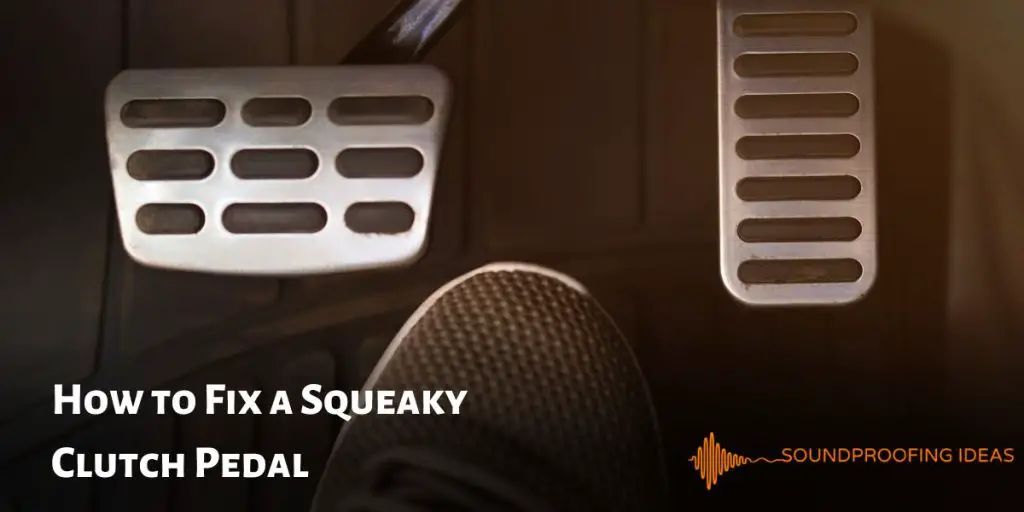Do you have a squeaky clutch pedal?
If so, you’re not alone. I recently experienced this issue in my car, and after some trial and error, I was able to figure out a few ways to get rid of the squeaking.
After selecting the best quiet tires, I faced this noise from the squeaky clutch pedal inside my card while trying to soundproof my car from outside noise.
In this blog post, I’m going to share with you the steps I took to fix my squeaky clutch pedal and hopefully help you out too!
Contents
What is a clutch?
The clutch transmits the rotational movement of the engine to the wheels. In a car, when you press the clutch pedal (the far left), the clutch disc and the flywheel separate, which temporarily stops the transmission of energy. This is when you can change gears.
I was surprised when I learned that it was possible to pass his license by driving only automatic cars.
In this case, do not even come to brag that you have the license. Anyway, joking aside now is the time to move on to fixing the problem for those who drive manual cars with a clutch that seems to be making squeaks or other suspicious noises.
Check that the problem comes from the clutch
Are you already sure that the noise is coming from the clutch? Because it can also come from other parts that interact with the clutch kit, such as the gearbox.
This is why, if you hear suspicious noises each time you apply the clutch, you will have to make sure that it is indeed the problem.
First, start by identifying when you hear these squeaks.
Is it when you are neutral or is it, on the contrary, when you are driving?
Does your clutch squeak when you disengage or when you engage?
Do the squeaks appear when you press the pedal or, on the contrary, at the end of the travel of the clutch bearing?
Is the clutch pedal harder than usual? Has she ever gotten stuck?
All of these questions will help you or your mechanic identify the cause of your problem.
Techniques for testing the clutch
Start by starting the engine and shifting to neutral. Then press your clutch pedal halfway through. Listen if it makes any noise.
Repeat the same test, this time pressing fully. Listen, again, if you hear noises such as squeaks, hisses, or squeaks. If you hear noises during these tests, it probably means that your clutch is too worn or malfunctioning.
Another way to know precisely if your clutch is worn or not: Engine on, put it in neutral, and handbrake applied. Press the clutch pedal. Shift into fourth gear by slowly releasing the clutch. Your vehicle should stall. If not, it means your clutch is malfunctioning.
It is therefore strongly recommended to contact a professional, who can find the fault and change your kit.
Causes and solutions of a squeaky clutch
A squeaking clutch is not necessarily a clutch that needs to be replaced. Various causes are possible.
Cause #1: The clutch pedal
The problem may come from the clutch pedal. It could simply be something blocking the pedal, preventing it from going all the way to the bottom and therefore preventing it from working properly.
For example, a poorly fitted floor mat can be the cause of this. This problem is very easily remedied, by repositioning your floor mat or by removing what may be interfering with the clutch pedal.
It can also come from an incorrect adjustment of the stroke of the pedal. It may have too much play or, on the contrary, not enough play.
In both cases, it is imperative to adjust it so that your clutch can function optimally but also so that it does not deteriorate too quickly. You can call your mechanic about this.
Cause #2: The clutch cable
When a clutch cable is too worn, the metal fibers from which it is made will get stuck in its sheath. This phenomenon causes noise.
If your clutch cable is dull, you will need to change it as soon as possible to avoid reaching a point where your pedal will be either too hard or too soft, where you will no longer be able to change gears, or where the wear of the clutch cable will lead to other severe malfunctions in the entire clutch kit.
Cause #3: Clutch fluid
When the clutch pedal is not sufficiently lubricated, it can cause squealing noises. Check your clutch fluid level.
If it is abnormally low, it may mean that there is a leak or that the hydraulic circuit of your clutch has lost its seal and has air bubbles.
Take your car quickly to the garage to check the cause of the low clutch fluid and find a solution.
Cause #4: The clutch release bearing
When the clutch release bearing is worn, this also causes noises. This is also the most common cause!
If the clutch thrust bearing is worn, changing the entire clutch kit is recommended to prevent other failures from occurring later.
How much does it cost to repair a squeaky clutch?
If your clutch squeaks, the repair price will depend on its cause. If the mechanic only needs to lubricate your clutch pedal, it will only cost you a few tens of dollars.
If he has to bleed your clutch fluid, the price can go up to $60.
Finally, if you have to change the entire clutch kit, it will cost you an average of $600.
Depending on the vehicle, the price of parts, and the cost of labor, this could go up to $1,000 or more.

